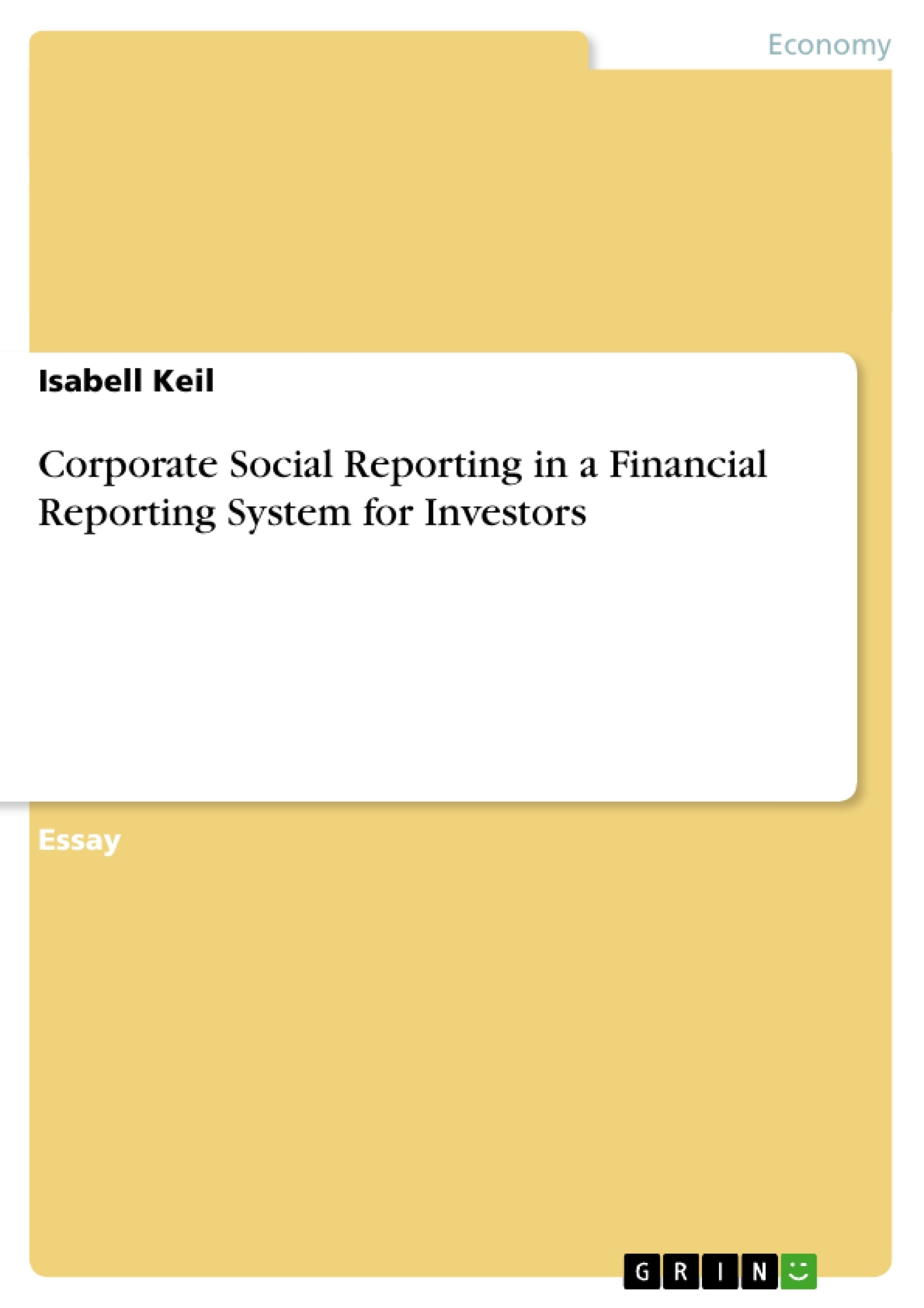Excerpt
This essay will give a short overview of the discussion about corporate social reporting (CSR), its implementation and the contradiction with traditional financial reports. It will explain the role of traditional reporting and the reason for the increasing significance of CSR. The Ideas and attempts how to implement CSR in practice will then be discussed with the difficulties, advantages and disadvantages of CSR.
A financial reporting system deals with accountability. Traditionally, accountability is regarded as providing a report, a statement of facts in financial terms, about the performance of a company. The basic idea goes back to the 19th century when companies developed and investors wanted to make sure the directors managed funds in their interests. The original accountant’s role can therefore be seen in providing financial information to reassure the shareholders and creditors. The main elements of accountability in accordance with company law are the production of adequate accounting records in a standardised format and a balance sheet that shows a true statement of capital, property, debts as well as profit and loss. The balance sheet has to be sent to every shareholder and should be accessible to the public (Perks, 1993).
Muchene (2001) notes that, historically, companies had to make financial information available to obtain external financing. Furthermore, they are accountable to many various different groups in society and expected to disclose information in addition to financial position and performance (Perks, 1993). AccountAbility (1999) identifies shareholders, customers, the public, employees, suppliers, creditors, the government, trade unions, business partners, competitors, the electorate, non-governmental-organisations, pressure groups and influencer as well as local international communities as core groups. Perks (1993) defines the following points as additional information: environmental disclosures, energy policies, fair business practices, human resources policies and activities, community involvement activities (e.g. health-related activities or education and arts), disclosures regarding product safety and other social responsibility disclosures. It can be concluded that current accounting systems are restricted in reporting social issues because of the limitation of most reports only to shareholders and management, the use of monetary measurements and exclusion of externalities.
There are different reasons for the increased significance of the role of business in society. Mathews (1993) distinguishes three justifications for additional disclosures. The first one is that the provision of non-financial information does have value for shareholders and financial markets. Secondly, socially related arguments are based on the assumption of a social contract between businesses and society. And the last one is a radical paradigm that refers to cultural aspects that affects disclosure practises. The Corporate Citizenship Company (2002, b) argues that the expansion of the private sector and the increasing globalisation process are responsible for the increasing emphasis on the social responsibility of companies. However, Muchene (2001) notes that improved media and communication technology, a more uniform view of the investor community of how companies should behave, and the growing importance of society-conscious investing led to the expectation of reporting of wider social issues and environmental behaviour. Businesses have to meet the expectations of certain core groups regarding responsible behaviour to assure their reputation; otherwise the long-term success of a business could be damaged. For example consumers may not buy companies’ products which will then reduce profits. Companies might find it difficult to attract and retain skilled employees or to find new business partners. Ethical investment funds could decide not to hold their shares in the future (Business Impact, 2002).
Today the debate about corporate social responsibility is shifting from “Why should we?” to “How should we?”. Dierkes and Berthoin-Antal (1986) distinguish three different models. The first is the inventory model which is an expansion of the traditional corporate report to include business-employee relations and charity work. Businesses using this inventory approach have extended their traditional corporate reports through broadening the scope of activities mentioned, developing more expressive indicators and quantifying positive and negative impacts of corporate activities. But there exists no common concept of theoretical guidelines and so systematisation, comprehensiveness and quantification is difficult.
The second model is the goal accounting and reporting model, which is based on the fact that companies operate on the basis of economic and social goals. The achievement of goals is measured by the use of indicators, which have to be clearly defined by management, e. g. company-customer relations. This model requires the active involvement of stakeholders. They are expected to contribute feedback in terms of evaluating the performance of the company. Dierkes and Berthoin-Antal (1986) mention that implementation of stakeholder feedback is difficult in practice. But companies following goal accounting improved in specification of economic and social goals.
The third model they describe is the social indicator model which emphasises the objectivity and comparability of social reports, which can only be achieved by using the same indicators - at least in similar industrial sectors. The difficulty in implementing this model lies in developing reliable and exact social indicators. Furthermore they name some disadvantages such as slow adoption of new and improved indicators, comprehensiveness of indicators and meeting the needs of all stakeholders because there are many stakeholders with a lot of different concerns and so there would be a large number of indicators.
Dierkes and Berthoin-Antal (1986) conclude that there is no universal model for CSR. Without public and stakeholder interest and pressure companies will probably choose the more modest model of expanding the traditional annual report. The more pressure that is put on businesses by constituency groups, the more likely it is that legislative efforts will be made, and objectivity and comparability will be maximised (Dierkes & Berthoin-Antal, 1986).
[...]
- Quote paper
- Isabell Keil (Author), 2002, Corporate Social Reporting in a Financial Reporting System for Investors, Munich, GRIN Verlag, https://www.grin.com/document/28896
Publish now - it's free























Comments